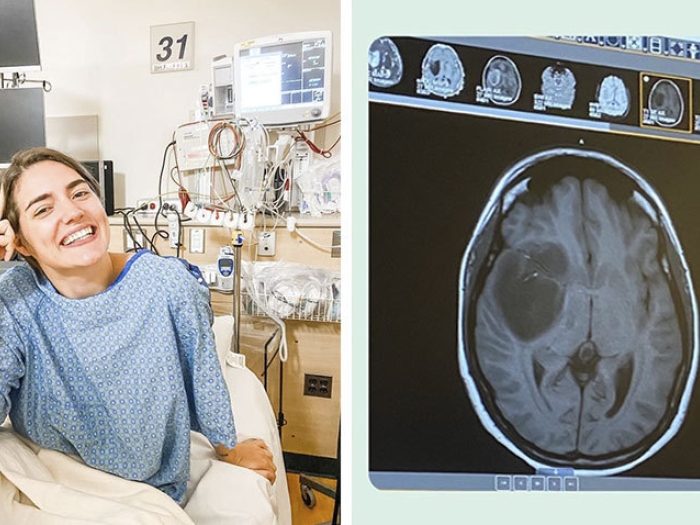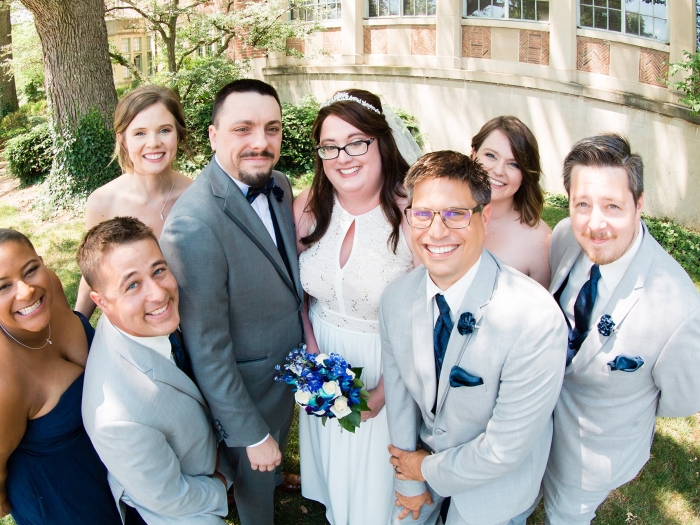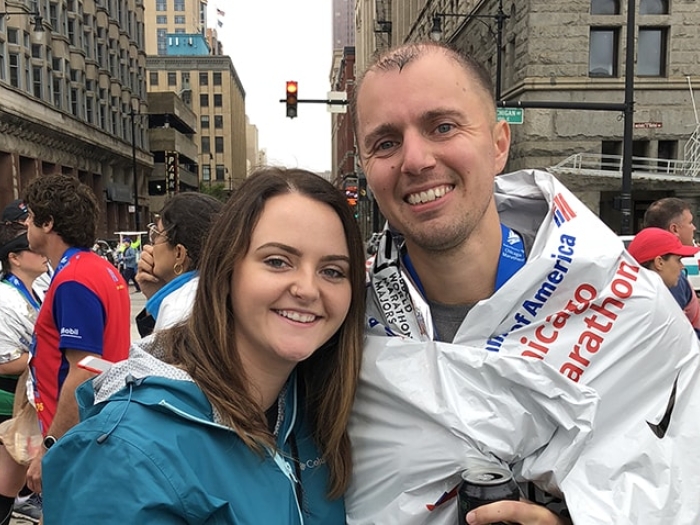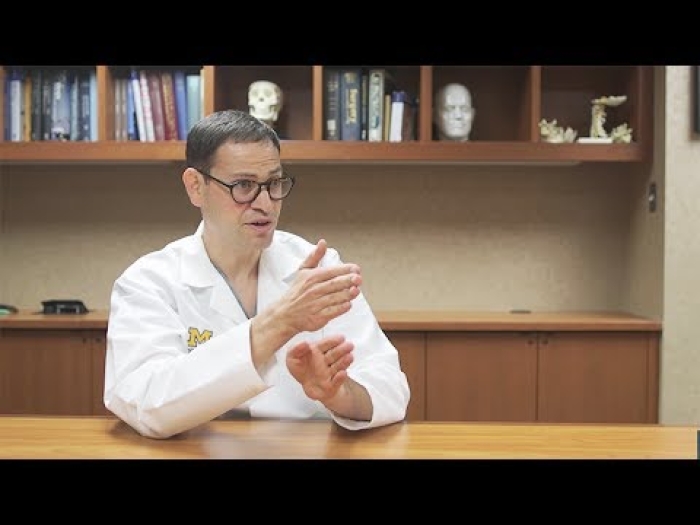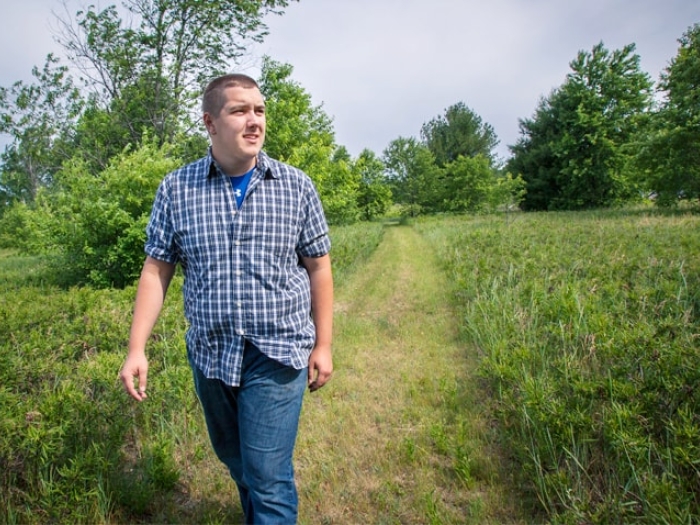Despite a brain tumor and serious, ongoing complications, one woman is determined to face challenges head on and live life her way.
5:00 AM
Author |

Terry Kennedy begins her days giving thanks for her health. The 55-year-old takes nothing for granted after facing significant challenges just a few years ago.
March 27, 2017, was a fairly routine day for the Ann Arbor, Michigan, resident until she began to feel something wasn't right. "I wondered if I was having a stroke or a heart attack," Kennedy recalls. Alone upstairs, she was able to call out to her husband, Tim, but that's all she remembers of the events that followed.
Tim raced upstairs to find his wife in the middle of a tonic-clonic seizure, also known as a grand mal seizure.
Kennedy was taken by ambulance to the Michigan Medicine Emergency Department, where an MRI revealed a golf ball size tumor identified as a meningioma. This type of benign, slow-growing tumor forms on membranes surrounding the brain and spinal cord. Although some individuals don't experience symptoms, common warning signs include seizures, dementia, difficulty with speech or vision or weakness on one side of the body.
Until her seizure that day, Kennedy had no indication of the tumor growing inside her head. And now, seemingly out of nowhere, she found herself facing brain surgery.
The operation was scheduled for the next week and would be performed by Michigan Medicine neurosurgeon B. Gregory Thompson, M.D.
"Dr. Thompson performed a difficult but successful surgery," says a grateful Kennedy. But four weeks later, just before her scheduled return to work, she began to feel exhausted, off balance and nauseous. When her arm began to droop and her right leg became weak, she was directed by Thompson to go to the emergency room for another MRI.
"The MRI showed fluid in the area where the tumor had been removed," Kennedy says. "I was diagnosed with an infection and was told by Dr. Thompson that I needed surgery immediately."
Kennedy's infection represented an "unusual complication," says Thompson. "Most infections begin on the outside and are detected within seven to 10 days of surgery. This patient's infection began deep inside, making it difficult to detect."
MORE FROM MICHIGAN: Sign up for our weekly newsletter
Neurosurgeon Aditya Pandey, M.D., performed Kennedy's surgery on April 21, 2017, removing the graft implanted during the first surgery as well as the area known as the bone flap as a precaution in case the infection had spread. The plan was to replace the bone flap with a titanium plate at a later date. Until then, Kennedy would need to wear a helmet to protect her head.
Kennedy remembers the moments following her operation as somewhat surreal. "As I was being wheeled from the operating room, someone kept saying, 'Mrs. Kennedy, move your right side.' I realized then that I couldn't move my right arm or leg. I was told there was a 1% chance of something like this happening," she says. "I knew I had to handle it."
Follow up MRIs and X-rays didn't reveal the reason for what was diagnosed as paresis, a partial loss of voluntary movement that can occur following a surgical procedure such as Kennedy's. "We prayed it was temporary," she says.
Kennedy began a physical therapy program within Michigan Medicine, determined to improve. With the ongoing support of her son, daughter and husband, as well as motivation from physical and occupational therapists, Kennedy worked diligently each day with the goal of being home in time to celebrate Mother's Day with her family.
"Eventually, my toes began to move, then my leg," she says. "My arm wasn't complying, but I kept working at it. I never thought I would not recover. I knew I'd get there."
The determined Kennedy met her remarkable goal.
"Much to everyone's surprise, I did it," she says. "I came home for Mother's Day walking with an intravenous antibiotic in my arm 24/7 for the next four weeks."
Kennedy continued to work on her arm strength while at home. "I would put my left hand on my right hand to show it what it was supposed to be doing," she says. Eventually, her arm regained strength.
On July 24, Thompson performed Kennedy's third surgery, a cranioplasty, by inserting a contoured graft made of titanium to replace her bone flap. Her goal this time was to be home to celebrate her 31st wedding anniversary on July 26th with her husband.
"And I was," she says proudly.
Like Podcasts? Add the Michigan Medicine News Break to your Alexa-enabled device or subscribe for daily updates on iTunes, Google Play and Stitcher.
She was also able to return to work at Gift of Life Michigan, an organization that facilitates organ tissue donation. However, after experiencing several seizures, Kennedy was diagnosed with epilepsy, which led to her retirement.
The seizures are likely being caused by swelling in the tissue that surrounded her tumor, says Michigan Medicine neurologist Yu Wang, B.M., Ph.D., who is currently treating Kennedy. "This swelling changes the circuitry of the brain forever. There's no way to predict if she'll have more seizures."
Despite her challenges, she continues to volunteer for Gift of Life Michigan, Wolverines for Life and Donate Life Coalition of Michigan — all organizations focused on promoting successful transplantations by educating the public about the importance of the Michigan Donor Registry.
Kennedy will likely be on seizure medication for the rest of her life, but says that's a small price to pay for the life she's living today. She credits her family's sense of humor and her art projects as therapy that has gotten her through the difficult times, along with a positive outlook and perseverance.
She says she is beyond grateful for caring doctors, nurses, friends, family and coworkers. "In all the challenges we faced, our family felt so blessed and cared for."

Explore a variety of healthcare news & stories by visiting the Health Lab home page for more articles.

Department of Communication at Michigan Medicine
Want top health & research news weekly? Sign up for Health Lab’s newsletters today!
